Fish Philosophy
Fish
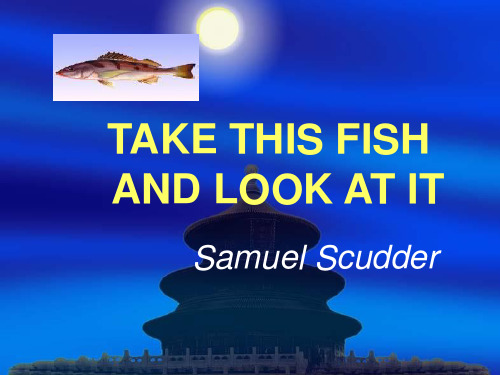
Para 7 haunt Vt
1) To inhabit, visit, or appear to in the form
of a ghost or other supernatural being. 以鬼魂形式出现:以鬼魂或其它超自然物体 的形式居住、拜访或出现 2) To visit often; frequent: 经常拜访;常去: haunted the movie theaters.
注册孩子们入幼儿园;作会议记录
2) v.intr.(不及物动词)
To place one's name on a roll or register;
sign up: 注册登记:注册、记录某人名字在花名册上; 登记: We enrolled in the army.
我们登记入伍了
经常去电影院
3) To come to mind continually; obsess:
时常萦绕心头;使困窘:
a riddle that haunted me all morning.
一个困扰我整个上午的谜语
4) To be continually present in; pervade: 时常出现在;弥漫: the melancholy that haunts the composer's
把防晒膏涂抹在我脸 上和臂上
3) To stain by or as
4) To stain or
if by spreading or attempt to destroy daubing with a the reputation of; sticky, greasy, or vilify: dirty substance. 污蔑,诋毁:玷污或 弄脏:用或似乎用扩 企图毁掉某人的名誉; 诽谤: 散或涂抹的方法用粘 着、油滑或肮脏的物 political enemies 质弄污
英汉海洋文化影响下相关习语的对比研究

英汉海洋文化影响下相关习语的对比研究一、引言海洋文化是与海洋有关的文化,是人类对海洋本身的认识、利用和因海洋而创造出来的精神的、行为的、社会的和物质的文明生活内涵。
海洋文化的本质,就是人类与海洋的互动关系及其产物(曲金良,1999)。
换言之,海洋文化是一种包括物质文明与精神文明的文化,其本质是人类与海洋的互动关系,即人类在接触、认识、利用海洋过程中所创造的文化,比如航海文化。
受海洋文化的影响,英汉语言中出现了数目众多的与海洋相关的习语。
根据Webster’s New World Dictionar y of American English(1988)及Longman Dictionary of Contemporary English(1998)的定义,习语通常是一种具有隐含义,并且必须建立在实践经验基础之上,已经约定俗成的语言。
习语有广义和狭义之分,狭义的习语仅指成语,而广义的习语包括成语、谚语、俚语、俗语等(李建军,2004)。
本文采用广义的习语分类,在“萨丕尔-沃尔夫假说(the Sapir-Whorf hypothesis)”的基础上,以sea(海)、fish(鱼)为例,通过比较英汉语言中受海洋文化影响的习语,阐释两个民族在文化思维上的相似性及差异性。
二、背景介绍萨丕尔-沃尔夫假说(the Sapir-Whorf hypothesis)的主要观点是语言塑造思维模式。
迄今,国内外语言学家(Carroll J.,1956;Brown,1967;Carroll D.W.,2008;高一虹,2000;胡壮麟,2002;刘润清,2002;姚小平,2002;卢植,2006;陈运香,2007)对该假说进行了大量研究,并将其分为两种形式:一种是强势形式,称为语言决定论;另一种是弱势形式,即语言相对论,主张语言、文化和思维相互联系。
基于“萨丕尔-沃尔夫假说”,本文将主要从文化对语言的影响展开论述,认为语言离不开文化,一个民族的文化对其语言有着全面而深刻的影响。
介绍《渔夫和金鱼》故事的英语作文初中
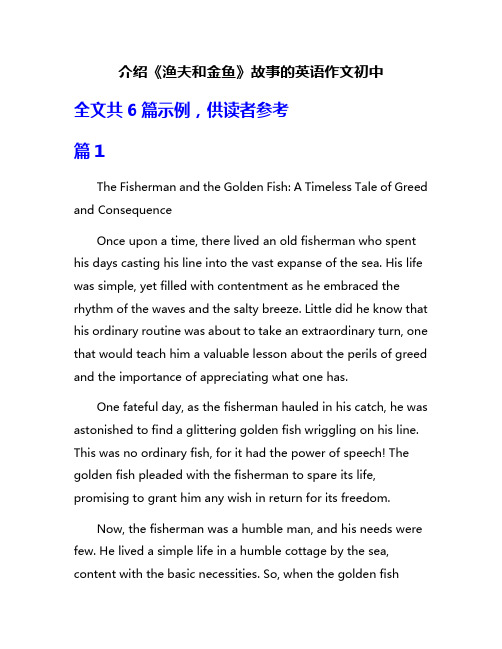
介绍《渔夫和金鱼》故事的英语作文初中全文共6篇示例,供读者参考篇1The Fisherman and the Golden Fish: A Timeless Tale of Greed and ConsequenceOnce upon a time, there lived an old fisherman who spent his days casting his line into the vast expanse of the sea. His life was simple, yet filled with contentment as he embraced the rhythm of the waves and the salty breeze. Little did he know that his ordinary routine was about to take an extraordinary turn, one that would teach him a valuable lesson about the perils of greed and the importance of appreciating what one has.One fateful day, as the fisherman hauled in his catch, he was astonished to find a glittering golden fish wriggling on his line. This was no ordinary fish, for it had the power of speech! The golden fish pleaded with the fisherman to spare its life, promising to grant him any wish in return for its freedom.Now, the fisherman was a humble man, and his needs were few. He lived a simple life in a humble cottage by the sea, content with the basic necessities. So, when the golden fishasked what he desired, the fisherman requested nothing more than a sturdy new fishing rod to replace his old, weathered one.The golden fish granted his wish, and the fisherman returned home with a magnificent new fishing rod in hand. However, his wife, upon seeing the extraordinary rod, became consumed by envy and greed. She insisted that the fisherman return to the sea and demand a grand new cottage from the golden fish, for their current humble abode was no longer befitting of her desires.Reluctantly, the fisherman obliged, and the golden fish granted them a lavish new cottage, complete with every luxury imaginable. Yet, the wife's greed knew no bounds, and she soon grew dissatisfied with their newfound wealth. She demanded a palace fit for royalty, and the fisherman had no choice but to seek out the golden fish once more.This cycle of greed and insatiable desire continued, with the wife constantly demanding more and more from the generous golden fish. From a palace, she desired an entire kingdom, complete with subjects to serve her every whim. And when even that was not enough, she demanded to become the ruler of the entire ocean and all its inhabitants.Finally, the golden fish could bear the wife's greed no longer. With a flick of its tail, it revoked all the extravagant gifts,returning the fisherman and his wife to their humble cottage by the sea. The fisherman, humbled by the experience, embraced their simple life once more, grateful for the lessons he had learned.Through this captivating tale, we are reminded of the dangers of greed and the importance of appreciating the simple pleasures in life. The fisherman's journey teaches us that true contentment lies not in accumulating material possessions but in finding joy in the present moment and embracing the beauty of the world around us.The story's enduring popularity stems from its universal appeal and timeless message. Greed is a human trait that transcends cultures and eras, and the temptation to seek more and more can be a powerful force. Yet, the tale of the fisherman and the golden fish serves as a gentle reminder that true happiness cannot be bought or demanded; it must be cultivated from within, through gratitude, humility, and a appreciation for the simple pleasures that life has to offer.Moreover, the story carries an important environmental message, reminding us to respect and cherish the natural world. The golden fish, a magical creature of the sea, represents the delicate balance of nature and the consequences of exploiting itfor personal gain. By granting the fisherman's wishes, the golden fish symbolizes the generosity of the natural world, but the wife's insatiable greed ultimately leads to the loss of those gifts, underscoring the importance of living in harmony with our surroundings.In a world that often values material wealth and excess, the tale of the fisherman and the golden fish serves as a poignant reminder to pause, reflect, and appreciate the beauty and simplicity of life. It encourages us to cultivate gratitude for what we have, rather than constantly striving for more. After all, true wealth lies not in possessions but in the contentment and peace we find within ourselves and in the world around us.As students, we can draw inspiration from this timeless tale and apply its lessons to our own lives. In the pursuit of academic excellence and future success, it is easy to become consumed by ambition and a desire for more – better grades, more accolades, and loftier goals. However, the story of the fisherman and the golden fish reminds us to strike a balance, to appreciate the present moment, and to find joy in the simple act篇2The Fisherman and the Golden Fish: A Timeless Tale of Greed and ConsequencesHave you ever heard the story of "The Fisherman and the Golden Fish"? It's a classic folk tale that has been passed down for generations, teaching valuable lessons about greed, contentment, and the consequences of our actions. As a middle school student, I find this story not only entertaining but also thought-provoking, reminding me of the importance of being grateful for what we have and the dangers of insatiable desires.The story begins with a humble fisherman who, one day, catches a golden fish in his net. To his surprise, the fish starts speaking to him, pleading for its life and promising to grant him any wish in return for its freedom. The fisherman, being a simple and content man, has no grand desires and decides to release the fish back into the water.However, when the fisherman returns home and tells his wife about the encounter, she becomes outraged at his decision and insists that he go back and ask the fish for a new cottage to replace their humble dwelling. The fisherman, not wanting to displease his wife, reluctantly returns to the sea and calls upon the golden fish, who grants his wish.But the wife's greed knows no bounds. She soon becomes dissatisfied with the cottage and demands a grand castle fit for royalty. The fisherman, against his better judgment, once again seeks out the golden fish, who fulfills her request, warning him about the consequences of insatiable desires.As the story progresses, the wife's demands escalate, each time becoming more outrageous and unreasonable. She desires to be the ruler of the sea, then the entire world, and finally, she demands to be granted the power of God himself. With each request, the golden fish pleads with the fisherman to be content and warns him of the grave consequences that will follow if they continue down this path of greed.Ultimately, the wife's insatiable greed leads to their downfall, and they are left with nothing but their original humble cottage, just as they had started.This timeless tale resonates with me on a personal level, as it serves as a powerful reminder of the dangers of greed and the importance of being content with what we have. As a middle school student, I often find myself surrounded by advertisements and societal pressures that perpetuate the idea of never being satisfied with what we have, constantly striving for more possessions, more status, and more material wealth.However, the story of "The Fisherman and the Golden Fish" teaches us that true happiness and contentment cannot be found in the accumulation of wealth or power. Instead, it lies in appreciating the simple things in life, being grateful for what we have, and understanding that excessive greed can lead to our downfall.Moreover, the story highlights the importance of listening to wise counsel and heeding warnings. The golden fish repeatedly cautioned the fisherman about the consequences of their actions, but the wife's greed blinded her to reason. This teaches us the value of being open to advice, especially from those who have experienced the consequences of their actions firsthand.As I reflect on this story, I am reminded of the importance of cultivating gratitude and contentment in my own life. While it's natural to have ambitions and goals, it's crucial to strike a balance and not allow our desires to consume us to the point of disregarding reason and losing sight of what truly matters.The story of "The Fisherman and the Golden Fish" is a timeless reminder that true fulfillment comes from within, not from external possessions or power. It encourages us to appreciate the simple joys of life, to be grateful for what we have,and to exercise moderation in our desires, lest we fall victim to the same fate as the greedy wife in the tale.As a middle school student navigating the complexities of life and the pressures of modern society, this story serves as a valuable compass, guiding me towards contentment, gratitude, and the avoidance of the pitfalls of excessive greed. It is a lesson that transcends time and cultures, reminding us of the enduring wisdom found in folktales and the importance of carrying these timeless teachings into our daily lives.篇3The Fisherman and the Golden Fish: A Timeless Tale of Greed and ContentmentOne of the most captivating folktales I've come across is the story of "The Fisherman and the Golden Fish." This Russian fairy tale, with its timeless moral lessons, has left an indelible mark on my imagination. Let me take you on a journey through this enchanting narrative, where a humble fisherman's encounter with a magical golden fish tests the boundaries of human greed and contentment.The story begins with an old fisherman, living a simple but content life by a vast blue sea. One day, as he casts his net intothe waters, he catches a peculiar golden fish. To his astonishment, the fish speaks to him, pleading for its life and promising to grant him any wish in exchange for its freedom. Moved by its words, the kindhearted fisherman releases the golden fish back into the sea, asking for nothing in return.Upon returning home, the fisherman's wife, dissatisfied with their modest dwelling, demands that he return to the golden fish and wish for a new cottage. Reluctantly, the fisherman complies, and to his amazement, the wish is granted. However, this is merely the beginning of a downward spiral fueled by insatiable greed.As the tale progresses, the fisherman's wife becomes increasingly dissatisfied, compelling her husband to repeatedly seek out the golden fish and make ever-grander wishes. From a cozy cottage to a lavish palace, from riches to power, her desires know no bounds. With each granted wish, her ambition grows, blinding her to the contentment they once cherished.The golden fish, a manifestation of benevolence and wisdom, repeatedly cautions the fisherman against his wife's greed, but their pleas fall on deaf ears. The once-humble couple becomes consumed by their ever-increasing demands, losing sight of the true value of simplicity and gratitude.As a reader, I found myself captivated by the story's ability to convey profound truths about human nature. It serves as a poignant reminder that greed, if left unchecked, can lead to our downfall. The fisherman's wife's insatiable desires ultimately result in the loss of everything they had once cherished, leaving them with nothing but regret and a bitter lesson learned.Moreover, the tale highlights the importance of contentment and appreciating what one has. The fisherman's initial satisfaction with his simple life stands in stark contrast to his wife's constant yearning for more. This dichotomy invites us to reflect on our own lives and the true sources of happiness and fulfillment.Throughout the narrative, the golden fish emerges as a symbol of wisdom and generosity. Its repeated warnings and willingness to grant wishes, despite the couple's escalating greed, serve as a reminder to approach life with humility and gratitude. The fish's eventual departure serves as a poignant consequence of the fisherman's wife's insatiable desires, leaving the couple to confront the emptiness of their greed-driven existence.Beyond its moral lessons, the story's vivid imagery and engaging narrative have left a lasting impression on me. The descriptions of the vast blue sea, the humble cottage, and theopulent palace transport the reader into a world of wonder and enchantment. The dynamic between the fisherman and his wife, and their contrasting attitudes towards the golden fish's gifts, create a compelling narrative tension that keeps the reader invested until the very end.In conclusion, "The Fisherman and the Golden Fish" is a timeless tale that transcends cultural boundaries and resonates with readers of all ages. Its cautionary message about the perils of greed and the importance of contentment remains as relevant today as it was centuries ago. Through its engaging storytelling and profound moral lessons, this fairy tale has become a cherished part of my literary experience, reminding me to approach life with gratitude, humility, and a recognition of what truly matters.篇4The Fisherman and the Golden Fish: A Lesson in Greed and GratitudeOne of the most fascinating folktales I've read is the Russian story "The Fisherman and the Golden Fish." It's a simple tale, but it packs a powerful moral about greed, contentment, and appreciating what you have. Let me give you a quick summary.The story begins with an old fisherman who lives in a tiny rundown shack with his wife. One day, while fishing, he catches a golden fish who begs to be released, promising to grant the fisherman a wish in return. The kind-hearted man lets the fish go. When he tells his greedy wife about it, she demands he go back and ask the fish for a new tub to replace her broken one.The fisherman reluctantly summons the fish, who grants his wish. But the wife isn't satisfied and nags her husband to keep asking for more lavish items like a grand house, riches, power, and eventually to become the ruler of the land. Each time, the magic fish obliges despite its frustration. Finally, when the greedy wife demands to become the ruler of the universe, controlling the sun, moon, and seas, the fish refuses. As punishment for her insatiable greed, the couple ends up back in their original dilapidated shack with nothing.While it may seem like a straightforward children's tale on the surface, the story holds much deeper wisdom when you look closer. It serves as a cautionary tale against the destructive forces of greed and discontentment. The fisherman's wife's greed blinds her to all the wealth and comforts the fish had already provided. No matter how much she gains, it's never enough, and she risks losing everything through her avarice.I think one of the most tragic parts is how the wife's greed also corrupts the once-humble fisherman. At first, he's the voice of reason, content with their simple life. But he becomes a passive enabler, fetching each new wish from the fish against his better judgment to appease his disgruntled wife. It makes me wonder how many people get dragged into unwise decisions by the greedy demands of others.In contrast, the golden fish represents generosity, patience, and wisdom. It rewards the fisherman's initial kindness and tries its best to fulfill each escalating request, no matter how outrageous. Only when the wife's demands cross an uncrossable line does the fish put its foot down, illustrating there are limits to appeasing excessive greed.On a deeper level, the story explores the concept of knowing when you have "enough." The couple starts off with the bare minimum - a dingy shack and presumably some means to catch food. But to the wife, even gaining wealth, power, and an entire kingdom isn't sufficient. She cannot appreciate her good fortune or recognize a limit to her wants. Only when the fish strips it all away does she (presumably) learn her greed went too far.For me, this tale sends a powerful reminder to practice gratitude, even for life's simple blessings. The fisherman initiallyunderstood the value of contentment, being thankful for a humble roof over his head and food to eat. It's a sentiment I try to emulate in my own life - to appreciate the good things I have rather than obsessing over wants and indulging an "endless more" mentality like the greedy wife.The story also cautions about prioritizing material wealth and status over more meaningful forms of prosperity. Sure, the wife gained money, a luxurious home, and authority for a time. But her constant fixation on the next bigger, better prize cost her peace, satisfaction, and ultimately, everything. It makes you wonder what true "wealth" looked like between the couple's initial poverty and the wife's delusions of grandeur toward the end.While "The Fisherman and the Golden Fish" is an old folktale, I'd argue its lessons remain hugely relevant today in our often excessive, materialistic society. Many of us (myself included) frequently get caught up in hunger for the latest gadgets, fashions, and status symbols. Advertising relentlessly bombards us with idyllic messages that newer/bigger/篇5The Fisherman and the Golden Fish: A Lesson in Gratitude and ContentmentOne of the most fascinating folktales I've come across is the Russian story "The Fisherman and the Golden Fish." This captivating narrative, steeped in symbolism and moral lessons, has left an indelible mark on my young mind. It's a tale that transcends cultural boundaries, resonating with readers of all ages and backgrounds.The story revolves around a humble fisherman who, through an unexpected encounter with a magical golden fish, finds himself in possession of a remarkable power – the ability to have his wishes granted. At first, the fisherman's requests are modest, reflecting the simple desires of a man content with his humble existence. However, influenced by his greedy wife, his desires escalate rapidly, spiraling into a vortex of insatiable greed and ambition.As the tale unfolds, we witness the fisherman's transformation from a contented individual to one consumed by an unquenchable thirst for more. With each wish granted, his wife's demands become increasingly extravagant, until they ultimately seek to usurp the power of the very entity that bestowed these gifts upon them – the golden fish itself.What strikes me most about this story is its profound exploration of human nature and the dangers of unchecked greed. It serves as a poignant reminder that true happiness and fulfillment cannot be found in the accumulation of material possessions or the pursuit of power. Rather, it lies in cultivating a sense of gratitude and contentment with what one already possesses.The fisherman's initial humility and appreciation for his simple life stand in stark contrast to his wife's insatiable desire for more. Her relentless demands serve as a cautionary tale, highlighting the corrosive effects of greed on the human soul. As the story progresses, we witness the erosion of theironce-harmonious existence, replaced by a toxic cycle of want and dissatisfaction.Yet, amidst the cautionary tone, the story also offers a glimmer of hope. In the end, the fisherman, having lost everything, is forced to confront the consequences of his actions and those of his wife. It is in this moment of profound realization that he finds the strength to acknowledge his mistakes and embrace a newfound appreciation for the simple joys of life.The symbolic significance of the golden fish itself is also noteworthy. Representing the boundless generosity and wisdomof the natural world, the fish serves as a reminder that true wealth lies not in material possessions but in the wonders of the world around us and the contentment that comes from living in harmony with it.As a middle school student, this story resonates with me on multiple levels. In an age where consumerism and the pursuit of status and material wealth are often glorified, "The Fisherman and the Golden Fish" offers a refreshing counterpoint. It reminds us that true happiness is not found in the accumulation of possessions but rather in cultivating a sense of gratitude and appreciation for the simple pleasures of life.Moreover, the story's emphasis on the consequences of greed and the erosion of relationships serves as a cautionary tale for young people like myself. It underscores the importance of maintaining perspective and fostering healthy relationships built on mutual respect and understanding, rather than allowing greed and selfish desires to poison our connections with others.In a篇6The Fisherman and the Golden Fish: A Timeless Tale of Greed and GratitudeDo you ever find yourself wishing for more than you already have? Maybe you covet the latest gadget, fancy clothes, or material possessions that your friends or classmates flaunt.We've all been there – caught up in the cycle of wanting, wanting, and never feeling satisfied. However, the old Russian folk tale "The Fisherman and the Golden Fish" serves as a powerful reminder of the dangers of insatiable greed and the importance of appreciating what we have.The story follows a humble fisherman who, one day, catches a golden fish in his net. To his surprise, the fish speaks, promising to grant him any wish in exchange for its freedom. At first, the fisherman simply asks for a new washtub to replace his worn-out one, as his wife instructed him. However, his greedy wife is never content, and she constantly demands more and more extravagant wishes from the golden fish.Their requests escalate from a cozy cottage to a stately palace, from riches to power and authority. With each granted wish, the wife's greed grows, and she becomes increasingly dissatisfied. Finally, in a fit of arrogance, she demands to become the ruler of the entire ocean and all its creatures. At this point, the golden fish revokes all their previous wishes, leaving themwith nothing but their original run-down shack and the fisherman's worn washtub.As a student, I find this tale incredibly relatable and poignant. We live in a world bombarded by advertisements and social media influencers constantly telling us we need the latest and greatest things to be happy and fulfilled. It's easy to get caught up in the cycle of wanting more, never feeling truly satisfied with what we have.The fisherman's wife represents the insatiable human desire for more – more wealth, more power, more status. Her greed blinds her to the simple joys of life and the contentment she could have found in modest living. Instead, she becomes consumed by her ambitions, losing sight of what truly matters.On the other hand, the golden fish serves as a symbol of the consequences of unchecked greed. Its ability to grant wishes is a double-edged sword, as the fisherman's wife's constant demands eventually lead to the loss of everything they had. The fish's decision to revoke the wishes serves as a powerful lesson –that greed and ingratitude have dire consequences.As a student, I can relate to the temptation of wanting more – whether it's the latest smartphone, trendy clothes, or even academic accolades. However, this tale reminds me of theimportance of gratitude and contentment. It's easy to get caught up in the rat race of constantly wanting more, but true happiness often lies in appreciating what we already have.Moreover, the story highlights the value of moderation and restraint. The fisherman's initial modest wish for a new washtub represents a reasonable and humble desire. Had his wife been content with their modest cottage and the simple pleasures of life, they could have lived happily ever after. But her insatiable greed and constant demands ultimately led to their downfall.In our modern world, where consumerism and materialism are so prevalent, this tale serves as a timeless reminder to be mindful of our desires and to appreciate the simple joys of life. It encourages us to cultivate gratitude for what we have, rather than constantly chasing after more and more.As a student, I find this lesson particularly valuable. The pressure to excel academically, secure prestigious internships, and accumulate accolades can sometimes lead to a sense of never being good enough. The fisherman and the golden fish remind me to appreciate the journey, celebrate my achievements, and find contentment in the present moment, rather than constantly striving for more.In conclusion, "The Fisherman and the Golden Fish" is a timeless tale that resonates with people of all ages and backgrounds. Its powerful message about the dangers of greed and the importance of gratitude and contentment is as relevant today as it was centuries ago. As a student navigating the pressures and temptations of modern life, this story serves as a valuable reminder to appreciate what I have, practice moderation, and find joy in the simple pleasures of life. After all, true happiness lies not in accumulating more and more possessions or accolades, but in cultivating a grateful heart and a contented spirit.。
关于鱼的英语谚语
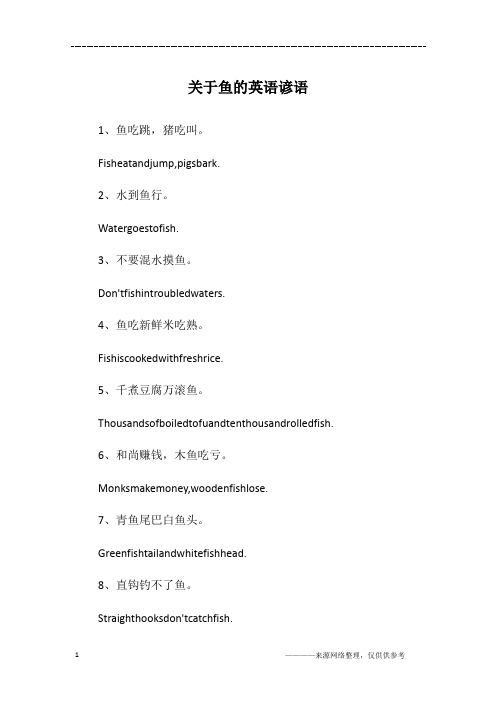
关于鱼的英语谚语1、鱼吃跳,猪吃叫。
Fisheatandjump,pigsbark.2、水到鱼行。
Watergoestofish.3、不要混水摸鱼。
Don'tfishintroubledwaters.4、鱼吃新鲜米吃熟。
Fishiscookedwithfreshrice.5、千煮豆腐万滚鱼。
Thousandsofboiledtofuandtenthousandrolledfish.6、和尚赚钱,木鱼吃亏。
Monksmakemoney,woodenfishlose.7、青鱼尾巴白鱼头。
Greenfishtailandwhitefishhead.8、直钩钓不了鱼。
Straighthooksdon'tcatchfish.1————来源网络整理,仅供供参考9、怕湿脚的人捉不到鱼。
Hewhofearswetfeetwillnotcatchfish.10、贪食的鱼儿易上钩。
Gluttonousfishcatcheasily.11、吃鱼的不如打鱼的乐。
Fishingisbetterthaneatingfish.12、大头菜,小头鱼。
Headvegetable,headfish.13、塘中鱼尽,白鹤起身。
Whenthefishinthepondisexhausted,thewhitecranerises.14、神仙难钓午后鱼。
It'shardforfairiestofishintheafternoon.15、鱼靠水,人靠集体。
Fishdependonwaterandmanoncollective.16、鳙鱼头,青鱼尾。
Bighead,greentail.17、千年草籽,万年鱼子。
Thousandsofyearsofgrassseeds,thousandsofyearsoffisheggs.————来源网络整理,仅供供参考 218、鱼游釜底,虽生不久。
Fishswiminthebottomofthecauldron,thoughnotlong.19、鱼长三暑。
海洋渔业英语谚语、俚语与休闲渔业
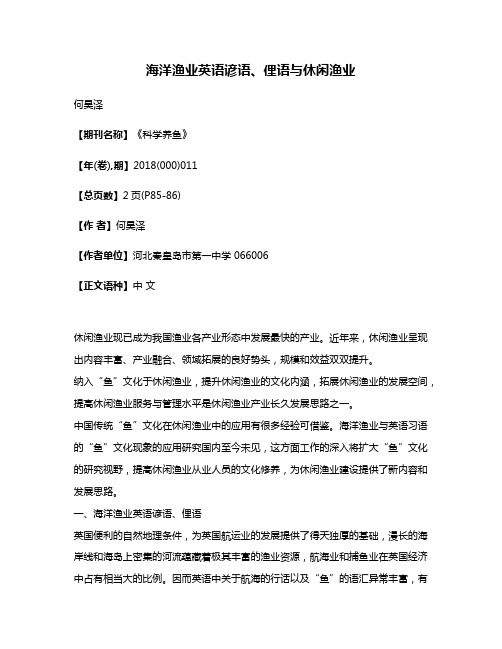
海洋渔业英语谚语、俚语与休闲渔业何昊泽【期刊名称】《科学养鱼》【年(卷),期】2018(000)011【总页数】2页(P85-86)【作者】何昊泽【作者单位】河北秦皇岛市第一中学 066006【正文语种】中文休闲渔业现已成为我国渔业各产业形态中发展最快的产业。
近年来,休闲渔业呈现出内容丰富、产业融合、领域拓展的良好势头,规模和效益双双提升。
纳入“鱼”文化于休闲渔业,提升休闲渔业的文化内涵,拓展休闲渔业的发展空间,提高休闲渔业服务与管理水平是休闲渔业产业长久发展思路之一。
中国传统“鱼”文化在休闲渔业中的应用有很多经验可借鉴。
海洋渔业与英语习语的“鱼”文化现象的应用研究国内至今未见,这方面工作的深入将扩大“鱼”文化的研究视野,提高休闲渔业从业人员的文化修养,为休闲渔业建设提供了新内容和发展思路。
一、海洋渔业英语谚语、俚语英国便利的自然地理条件,为英国航运业的发展提供了得天独厚的基础,漫长的海岸线和海岛上密集的河流蕴藏着极其丰富的渔业资源,航海业和捕鱼业在英国经济中占有相当大的比例。
因而英语中关于航海的行话以及“鱼”的语汇异常丰富,有很多相关的表达方式。
下面各举几例。
1.航海英语中的谚语、俚语 Who will not beruledbytheruddermustberuledby the rock.船离舵,要闯祸;Better lose the anchor than the whole ship.宁失锚,不失船;A great ship asks deep waters.大船要在深水行。
Back and fill:原为航海术语,当帆船逆风通过狭窄水道时,需要不断调整船帆,使船帆时而胀满,时而漏风,这种方法叫左右抢风法,此时船会时进时退、时左时右。
后来,口语里“back and fill”便有了动摇不定、出尔反尔的意思。
Cut and run:当船遇到危机情况却来不及起锚时,要采取一个紧急对策,砍断缆绳,放弃铁锚,马上开船行进。
关于鱼的英语谚语
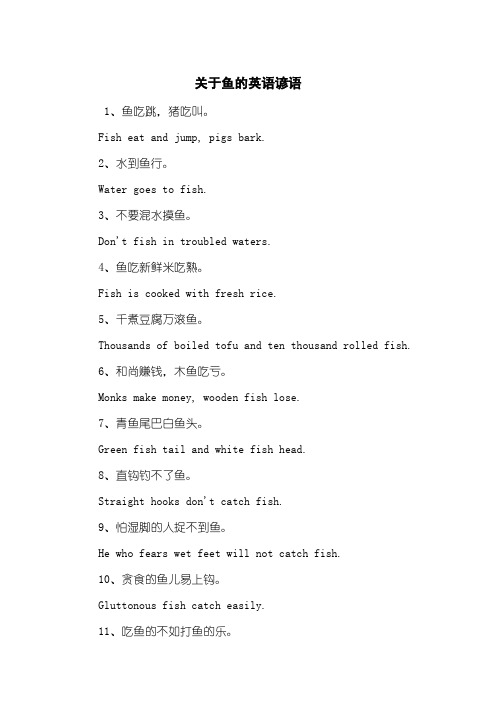
关于鱼的英语谚语1、鱼吃跳,猪吃叫。
Fish eat and jump, pigs bark.2、水到鱼行。
Water goes to fish.3、不要混水摸鱼。
Don't fish in troubled waters.4、鱼吃新鲜米吃熟。
Fish is cooked with fresh rice.5、千煮豆腐万滚鱼。
Thousands of boiled tofu and ten thousand rolled fish.6、和尚赚钱,木鱼吃亏。
Monks make money, wooden fish lose.7、青鱼尾巴白鱼头。
Green fish tail and white fish head.8、直钩钓不了鱼。
Straight hooks don't catch fish.9、怕湿脚的人捉不到鱼。
He who fears wet feet will not catch fish.10、贪食的鱼儿易上钩。
Gluttonous fish catch easily.11、吃鱼的不如打鱼的乐。
Fishing is better than eating fish.12、大头菜,小头鱼。
Head vegetable, head fish.13、塘中鱼尽,白鹤起身。
When the fish in the pond is exhausted, the white crane rises.14、神仙难钓午后鱼。
It's hard for fairies to fish in the afternoon.15、鱼靠水,人靠集体。
Fish depend on water and man on collective.16、鳙鱼头,青鱼尾。
Bighead, green tail.17、千年草籽,万年鱼子。
Thousands of years of grass seeds, thousands of years of fish eggs.18、鱼游釜底,虽生不久。
水产SCI期刊
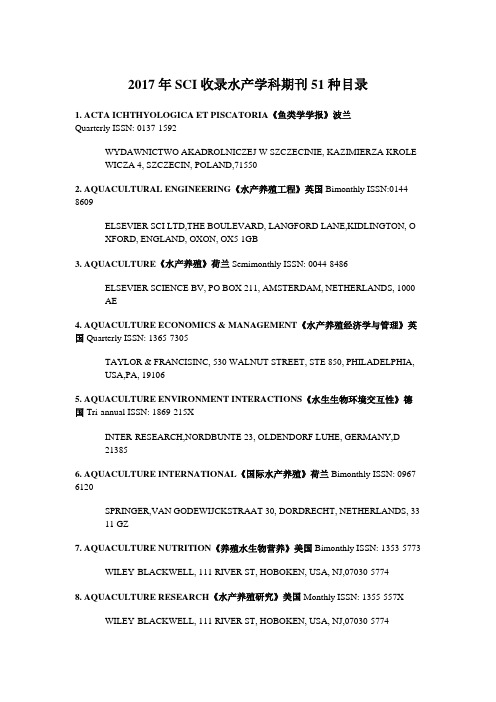
2017年SCI收录水产学科期刊51种目录1. ACTA ICHTHYOLOGICA ET PISCATORIA《鱼类学学报》波兰Quarterly ISSN: 0137-1592WYDAWNICTWO AKADROLNICZEJ W SZCZECINIE, KAZIMIERZA KROLE WICZA 4, SZCZECIN, POLAND,715502. AQUACULTURAL ENGINEERING《水产养殖工程》英国 Bimonthly ISSN:0144-8609ELSEVIER SCI LTD,THE BOULEVARD, LANGFORD LANE,KIDLINGTON, OXFORD, ENGLAND, OXON, OX5 1GB3. AQUACULTURE《水产养殖》荷兰Semimonthly ISSN: 0044-8486ELSEVIER SCIENCE BV, PO BOX 211, AMSTERDAM, NETHERLANDS, 1000 AE4. AQUACULTURE ECONOMICS & MANAGEMENT《水产养殖经济学与管理》英国 Quarterly ISSN: 1365-7305TAYLOR & FRANCISINC, 530 WALNUT STREET, STE 850, PHILADELPHIA, USA,PA, 191065. AQUACULTURE ENVIRONMENT INTERACTIONS《水生生物环境交互性》德国Tri-annual ISSN: 1869-215XINTER-RESEARCH,NORDBUNTE 23, OLDENDORF LUHE, GERMANY,D-213856. AQUACULTURE INTERNATIONAL《国际水产养殖》荷兰Bimonthly ISSN: 0967-6120SPRINGER,VAN GODEWIJCKSTRAAT 30, DORDRECHT, NETHERLANDS, 3311 GZ7. AQUACULTURE NUTRITION《养殖水生物营养》美国Bimonthly ISSN: 1353-5773WILEY-BLACKWELL, 111 RIVER ST, HOBOKEN, USA, NJ,07030-57748. AQUACULTURE RESEARCH《水产养殖研究》美国Monthly ISSN: 1355-557XWILEY-BLACKWELL, 111 RIVER ST, HOBOKEN, USA, NJ,07030-57749. AQUATIC LIVING RESOURCES《水生生物资源》法国Quarterly ISSN: 0990-7440EDPSCIENCES S A, 17, AVE DU HOGGAR, PA COURTABOEUF, BP 112, LES ULIS CEDEX A,FRANCE, F-9194 410. BOLETIM DO INSTITUTO DE PESCA《渔业学会通报》巴西Quarterly ISSN: 0046-9939INSTPESCA, AV FRANCISCO MATARAZZO, 455, SAO PAULO, BRAZIL, SP, 0 5001-90011. BULLETIN OF THE EUROPEAN ASSOCIATION OF FISHPATHOLOGISTS《欧洲鱼类病理学家协会简讯》英国Bimonthly ISSN:0108-0288EUR ASSOC FISHPATHOLOGISTS, C/O DR DAVID BRUNO, MARINE LABOR ATORY, PO BOX 101, VICTORIA RD,ABERDEEN, SCOTLAND, AB11 9DB12. CALIFORNIA COOPERATIVE OCEANIC FISHERIESINVESTIGATIONS REP ORTS《加利福尼亚海洋渔业合作调查报告》美国Annual ISSN: 0575-3317SCRIPPSINST OCEANOGRAPHY, A-003, LA JOLLA, USA, CA, 9209313. CALIFORNIA FISH AND GAME《加利福尼亚鱼与猎物》美国Quarterly ISSN: 0008-1078CALIFORNIA FISH AND GAME EDITOR, 1416 NINTH ST, SACRAMENTO, US A, CA, 9581414. CANADIAN JOURNAL OF FISHERIES AND AQUATIC SCIENCES 《加拿大渔业与水生科学杂志》加拿大Monthly ISSN: 0706-652XCANADIAN SCIENCEPUBLISHING, NRC RESEARCH PRESS, 65 AURIGA DR , SUITE 203, OTTAWA, CANADA, ON, K2E 7W615. CCAMLR SCIENCE《南极海洋生物资源保护委员会学报》澳大利亚Annual ISSN:1023-4063C C A M L R TI, PO BOX 213, NORTH HOBART, AUSTRALIA,TAS, 700216. DISEASES OF AQUATIC ORGANISMS《水生生物病症》德国Monthly ISSN: 0177-5103INTER-RESEARCH,NORDBUNTE 23, OLDENDORF LUHE, GERMANY,D-2138517. ECOLOGY OF FRESHWATER FISH《淡水鱼类生态学》美国Quarterly ISSN: 0906-6691WILEY-BLACKWELL, 111 RIVER ST, HOBOKEN, USA, NJ,07030-577418. FISH & SHELLFISH IMMUNOLOGY《鱼类与有壳水生生物免疫学》英国MonthlyISSN: 1050-4648ACADEMIC PRESSLTD- ELSEVIER SCIENCE LTD, 24-28 OVAL RD, LONDO N, ENGLAND, NW1 7DX19. FISH AND FISHERIES《鱼类与渔业》美国Quarterly ISSN: 1467-2960WILEY-BLACKWELL, 111 RIVER ST, HOBOKEN, USA, NJ,07030-577420. FISH PATHOLOGY《鱼病研究》日本Quarterly ISSN:0388-788XJAPAN SOC FISH PATHOLDEPT FISHERIES-FAC AGR, ACADEMY CENTER 358-5, YAMABUKI-CHO, SHINJUKU-KU, TOKYO, JAPAN,162-080121. FISH PHYSIOLOGY AND BIOCHEMISTRY《鱼类生理学和生物化学》荷兰Quarterly ISSN: 0920-1742SPRINGER,VAN GODEWIJCKSTRAAT 30, DORDRECHT, NETHERLANDS, 3311 GZ22. FISHERIES《水产》美国Monthly ISSN: 0363-2415TAYLOR &FRANCIS INC, 530 WALNUT STREET, STE 850, PHILADELPHIA, USA, PA, 1910623. FISHERIES MANAGEMENT AND ECOLOGY《渔业管理与生态学》美国Bimonthly ISSN: 0969-997XWILEY-BLACKWELL, 111 RIVER ST, HOBOKEN, USA, NJ,07030-577424. FISHERIES OCEANOGRAPHY《水产海洋学》美国Bimonthly ISSN: 1054-6006WILEY-BLACKWELL, 111 RIVER ST, HOBOKEN, USA, NJ,07030-577425. FISHERIES RESEARCH《渔业研究》荷兰Monthly ISSN: 0165-7836ELSEVIER SCIENCE BV, PO BOX 211, AMSTERDAM, NETHERLANDS, 1000 AE26. FISHERIES SCIENCE《水产科学》日本Bimonthly ISSN: 0919-9268SPRINGER JAPAN KK, CHIYODA FIRST BLDG EAST, 3-8-1NISHI-KANDA, C HIYODA-KU, TOKYO,JAPAN, 101-0 06527. FISHERY BULLETIN《水产通报》美国Quarterly ISSN: 0090-0656NATL MARINEFISHERIES SERVICE SCIENTIFIC PUBL OFFICE, 7600 SANDPOINT WAY NE BIN C15700, SEATTLE, USA,WA, 9811528. ICES JOURNAL OF MARINE SCIENCE《国际海洋勘探理事会海洋科学杂志》英国Monthly ISSN: 1054-3139OXFORD UNIV PRESS, GREAT CLARENDON ST, OXFORD, ENGLAND, OX26DP29. INDIAN JOURNAL OF FISHERIES《印度渔业杂志》印度Quarterly ISSN:0970-6011CENTRAL MARINEFISHERIES RESEARCH INST, INDIAN COUNCIL AGRICULTURAL RES, DR. SALIM ALI RD, P B NO 1603,TATAPURAM P O, ERNAKULAM, INDIA, COCHIN, 682 01430. IRANIAN JOURNAL OF FISHERIES SCIENCES 《伊朗渔业科学杂志》伊朗 Quarterly ISSN: 1562-2916IRANIAN FISHERIESSCIENCE RESEARCH INST-IFSRI, IRANIAN FISH SCI RES INST,TEHRAN-KARAJ HWY, EXITPAYKAN SHAHR, SARVENAZ AVE , SARVE AZAD AVE, W 8 ST, TEHRAN, IRAN, 0000031. ISRAELI JOURNAL OF AQUACULTURE-BAMIDGEH《以色列水产养殖杂志》以色列Quarterly ISSN:0792-156XISRAELI JOURNAL OFAQUACULTURE-BAMIDGEH, KIBBUTZ EIN HAMIFRATZ, D N, ASHRAT, ISRAEL,2521032. JOURNAL OF APPLIED ICHTHYOLOGY《应用鱼类学杂志》美国Bimonthly ISSN: 0175-8659WILEY-BLACKWELL, 111 RIVER ST, HOBOKEN, USA, NJ,07030-577433. JOURNAL OF AQUATIC ANIMAL HEALTH《水生动物卫生杂志》美国QuarterlyISSN: 0899-7659TAYLOR &FRANCIS INC, 530 WALNUT STREET, STE 850, PHILADELPHIA,USA, PA, 1910634. JOURNAL OF FISH BIOLOGY《鱼类生物学杂志》美国Monthly ISSN: 0022-1112WILEY-BLACKWELL, 111 RIVER ST, HOBOKEN, USA, NJ,07030-577435. JOURNAL OF FISH DISEASES《鱼病杂志》美国Monthly ISSN:0140-7775WILEY-BLACKWELL, 111 RIVER ST, HOBOKEN, USA, NJ,07030-577436. JOURNAL OF SHELLFISH RESEARCH《贝类研究杂志》美国Tri-annual ISSN: 0730-8000NATLSHELLFISHERIES ASSOC, C/O DR. SANDRA E. SHUMWAY, UNIV CONNECTICUT, 1080 SHENNECOSSETT RD, GROTON, USA, CT,0634037. JOURNAL OF THE WORLD AQUACULTURE SOCIETY《世界水产养殖学会志》美国Bimonthly ISSN:0893-8849WILEY-BLACKWELL, 111 RIVER ST, HOBOKEN, USA, NJ,07030-577438. KNOWLEDGE AND MANAGEMENT OF AQUATIC ECOSYSTEMS《水生生态系统知识与管理》法国Annual ISSN:1961-9502EDPSCIENCES S A, 17, AVE DU HOGGAR, PA COURTABOEUF, BP 112, LESULIS CEDEX A,FRANCE, F-9194 439. LATIN AMERICAN JOURNAL OF AQUATIC RESEARCH《拉丁美洲水研究杂志》智利Tri-annual ISSN: 0718-560XUNIV CATOLICA DE VALPARAISO, AV BRASIL 2950, POBOX 4059, VALPARAISO, CHILE40. MARINE AND COASTAL FISHERIES《海洋与沿海渔业》美国Annual ISSN: 1942-5120TAYLOR &FRANCIS INC, 530 WALNUT STREET, STE 850, PHILADELPHIA,USA, PA, 1910641. MARINE AND FRESHWATER RESEARCH《海洋与淡水研究》澳大利亚Monthly ISSN:1323-1650CSIRO PUBLISHING,UNIPARK, BLDG 1, LEVEL 1, 195 WELLINGTON RD, LOCKED BAG 10, CLAYTON, AUSTRA LIA,VIC, 316842. MARINE RESOURCE ECONOMICS《海洋资源经济学》美国Quarterly ISSN: 0738-1360UNIV CHICAGO PRESS, 1427 E 60TH ST, CHICAGO, USA, IL,60637-295443. NEW ZEALAND JOURNAL OF MARINE AND FRESHWATER RESEARCH《新西兰海洋与淡水研究杂志》英国Quarterly ISSN: 0028-8330TAYLOR &FRANCIS LTD, 2-4 PARK SQUARE, MILTON PARK, ABINGDON,ENGLAND, OXON, OR14 4RN44. NIPPON SUISAN GAKKAISHI《日本水产学会志》日本Bimonthly ISSN:0021-5392JAPANESE SOCFISHERIES SCIENCE, C/O TOKYO UNIV FISHERIES,KONAN4, MINATO, TOKYO, JAPAN, 108-847745. NORTH AMERICAN JOURNAL OF AQUACULTURE《北美水产业杂志》美国Quarterly ISSN: 1522-2055TAYLOR &FRANCIS INC, 530 WALNUT STREET, STE 850, PHILADELPHIA, USA, PA, 1910646. NORTH AMERICAN JOURNAL OF FISHERIES MANAGEMENT《北美水产管理杂志》美国Bimonthly ISSN:0275-5947TAYLOR &FRANCIS INC, 530 WALNUT STREET, STE 850, PHILADELPHIA, USA, PA, 1910647. REVIEWS IN AQUACULTURE《水产养殖评论》美国Quarterly ISSN: 1753-5123WILEY-BLACKWELL, 111 RIVER ST, HOBOKEN, USA, NJ,07030-577448. REVIEWS IN FISH BIOLOGY AND FISHERIES《鱼类生物学和渔业评论》荷兰Quarterly ISSN: 0960-3166SPRINGER,VAN GODEWIJCKSTRAAT 30, DORDRECHT, NETHERLANDS, 3311 GZ49. REVIEWS IN FISHERIES SCIENCE & AQUACULTURE《渔业科学与水产业评论》美国Quarterly ISSN: 2330-8249TAYLOR &FRANCIS INC, 530 WALNUT STREET, STE 850, PHILADELPHIA, USA, PA, 1910650. TRANSACTIONS OF THE AMERICAN FISHERIES SOCIETY 《美国水产学会汇刊》美国Bimonthly ISSN:0002-8487TAYLOR &FRANCIS INC, 530 WALNUT STREET, STE 850, PHILADELPHIA, USA, PA, 1910651. TURKISH JOURNAL OF FISHERIES AND AQUATIC SCIENCES《土耳其渔业和水产科学杂志》土耳其Quarterly ISSN: 1303-2712CENTRAL FISHERIESRESEARCH INST, PO BOX 129, TRABZON, TURKEY, 6 1001。
鱼对身体好处英语作文

鱼对身体好处英语作文Fish is a nutritious food that is rich in a variety of health benefits. Here is an essay on the benefits of fish for the bodyTitle The Health Benefits of Eating FishFish is a popular and healthy food choice that offers numerous health benefits. It is a great source of highquality protein omega3 fatty acids vitamins and minerals that contribute to overall wellbeing. In this essay we will explore the various ways in which fish can benefit our bodies.1. Omega3 Fatty Acids One of the most significant benefits of fish is its high content of omega3 fatty acids particularly EPA and DHA. These essential fatty acids play a crucial role in maintaining heart health by reducing inflammation lowering blood pressure and improving blood vessel function.2. Brain Health The omega3s in fish are also known to support brain health. They contribute to the development and maintenance of brain cells and are linked to improved cognitive function memory and mood regulation.3. AntiInflammatory Properties Fish especially fatty fish like salmon and mackerel have antiinflammatory properties. This can help reduce the risk of chronic diseases such as arthritis asthma and even certain types of cancer.4. Protein Source Fish is an excellent source of lean protein which is essential for muscle growth and repair. It is particularly beneficial for those looking to build muscle or maintain a healthy weight.5. Vitamins and Minerals Fish is rich in various vitamins and minerals including vitaminD calcium and potassium. These nutrients are vital for bone health immune function and maintaining a healthy metabolism.6. Improved Cardiovascular Health Regular consumption of fish has been linked to a reduced risk of heart disease. The omega3s in fish can help lower triglycerides reduce plaque buildup in arteries and decrease the risk of heart attacks and strokes.7. Eye Health Certain types of fish particularly those rich in omega3s can help maintaingood eye health and may reduce the risk of agerelated macular degeneration.8. Pregnancy Benefits Pregnant women are often advised to include fish in their diet due to its role in fetal development particularly in brain and eye development.9. Weight Management Fish is low in calories and high in protein making it an ideal food for those trying to manage their weight. It can help you feel fuller for longer periods reducing the likelihood of overeating.10. Longevity and Lifespan Studies have shown that people who consume fish regularly tend to have a longer lifespan. The nutrients in fish may contribute to a healthier heart and a reduced risk of various chronic diseases.In conclusion incorporating fish into your diet can provide a wide range of health benefits from improving heart and brain health to supporting weight management and longevity. It is recommended to consume a variety of fish to ensure you get a broad spectrum of nutrients. However its also important to be mindful of the potential presence of contaminants like mercury in some fish and to choose fish wisely to maximize the health benefits while minimizing potential risks.。
英文哲学书籍
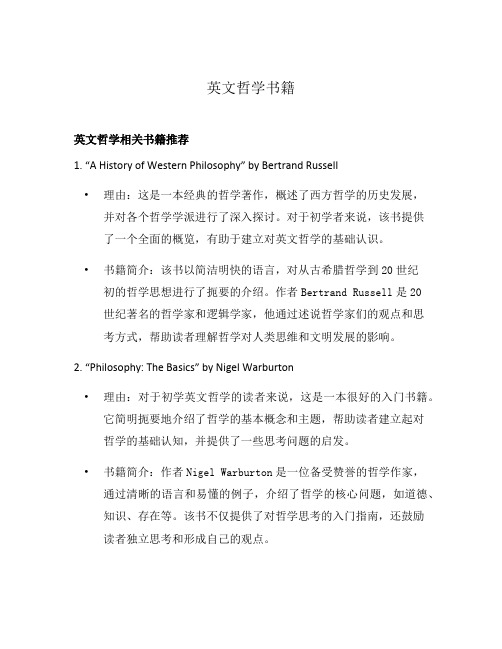
英文哲学书籍英文哲学相关书籍推荐1. “A History of Western Philosophy” by Bertrand Russell•理由:这是一本经典的哲学著作,概述了西方哲学的历史发展,并对各个哲学学派进行了深入探讨。
对于初学者来说,该书提供了一个全面的概览,有助于建立对英文哲学的基础认识。
•书籍简介:该书以简洁明快的语言,对从古希腊哲学到20世纪初的哲学思想进行了扼要的介绍。
作者Bertrand Russell是20世纪著名的哲学家和逻辑学家,他通过述说哲学家们的观点和思考方式,帮助读者理解哲学对人类思维和文明发展的影响。
2. “Philosophy: The Basics” by Nigel Warburton•理由:对于初学英文哲学的读者来说,这是一本很好的入门书籍。
它简明扼要地介绍了哲学的基本概念和主题,帮助读者建立起对哲学的基础认知,并提供了一些思考问题的启发。
•书籍简介:作者Nigel Warburton是一位备受赞誉的哲学作家,通过清晰的语言和易懂的例子,介绍了哲学的核心问题,如道德、知识、存在等。
该书不仅提供了对哲学思考的入门指南,还鼓励读者独立思考和形成自己的观点。
3. “Philosophy of Language” by Scott Soames•理由:语言哲学是英文哲学中的一个重要领域,了解语言哲学的核心概念和争议有助于更深入地理解和分析哲学问题。
该书是介绍语言哲学的经典之作,适合具有一定英文哲学基础的读者。
•书籍简介:作者Scott Soames是著名的语言哲学家,他在该书中系统而全面地讨论了语言哲学的核心议题,如语义学、修辞学和语言意义等。
读者通过该书可以了解语言哲学的不同研究方法和重要观点,以及它们对其他哲学分支的影响。
4. “Meditations” by Marcus Aurelius•理由:除了学术性书籍,了解哲学的其他形式也是培养对英文哲学兴趣的好方法。
fish人生二观后感600字作文
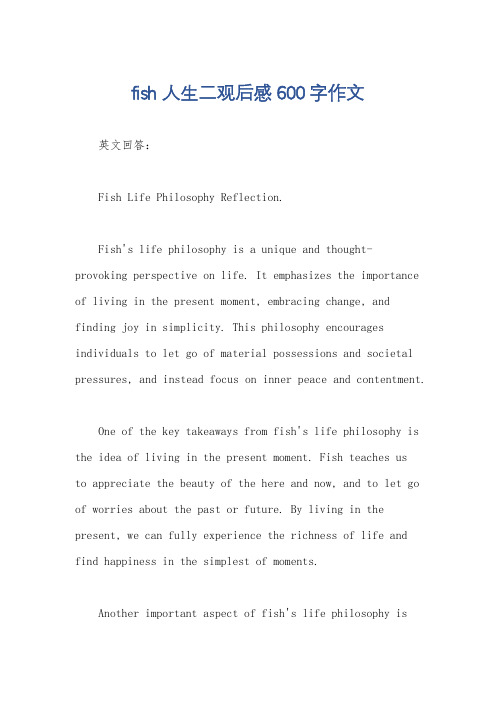
fish人生二观后感600字作文英文回答:Fish Life Philosophy Reflection.Fish's life philosophy is a unique and thought-provoking perspective on life. It emphasizes the importance of living in the present moment, embracing change, and finding joy in simplicity. This philosophy encourages individuals to let go of material possessions and societal pressures, and instead focus on inner peace and contentment.One of the key takeaways from fish's life philosophy is the idea of living in the present moment. Fish teaches usto appreciate the beauty of the here and now, and to let go of worries about the past or future. By living in the present, we can fully experience the richness of life and find happiness in the simplest of moments.Another important aspect of fish's life philosophy isthe acceptance of change. Fish reminds us that change is a natural part of life and that resisting it only leads to suffering. Instead, fish encourages us to embrace change and see it as an opportunity for growth and transformation. By accepting change, we can adapt to new circumstances and find new sources of joy and fulfillment.Fish's life philosophy also emphasizes the value of simplicity. In a world filled with materialism and excess, fish teaches us to find contentment in the basic necessities of life. By letting go of our attachment to material possessions and societal expectations, we can find true happiness and inner peace.Overall, fish's life philosophy offers a refreshing and insightful perspective on how to live a fulfilling life. By focusing on the present moment, embracing change, and finding joy in simplicity, we can cultivate a deep sense of contentment and live with greater purpose and meaning.中文回答:鱼的人生哲学是一种独特而发人深省的生活观。
授之于鱼不如授之于渔英语作文
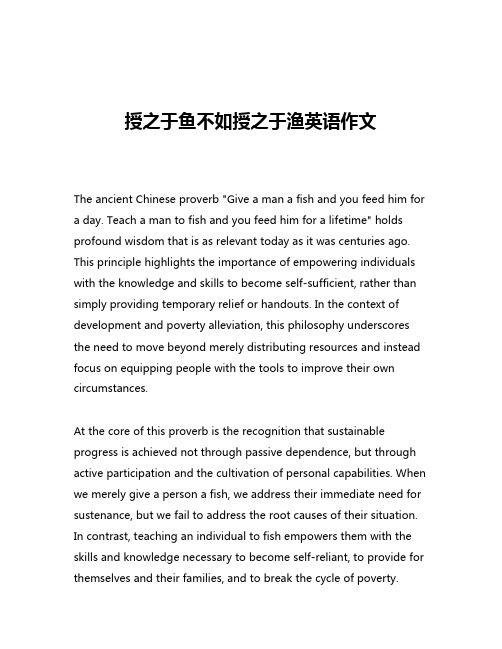
授之于鱼不如授之于渔英语作文The ancient Chinese proverb "Give a man a fish and you feed him for a day. Teach a man to fish and you feed him for a lifetime" holds profound wisdom that is as relevant today as it was centuries ago. This principle highlights the importance of empowering individuals with the knowledge and skills to become self-sufficient, rather than simply providing temporary relief or handouts. In the context of development and poverty alleviation, this philosophy underscores the need to move beyond merely distributing resources and instead focus on equipping people with the tools to improve their own circumstances.At the core of this proverb is the recognition that sustainable progress is achieved not through passive dependence, but through active participation and the cultivation of personal capabilities. When we merely give a person a fish, we address their immediate need for sustenance, but we fail to address the root causes of their situation. In contrast, teaching an individual to fish empowers them with the skills and knowledge necessary to become self-reliant, to provide for themselves and their families, and to break the cycle of poverty.This approach is particularly crucial in developing nations and impoverished communities, where the challenges of poverty are often deeply entrenched and multifaceted. Providing direct aid, such as food or monetary assistance, can offer temporary relief, but it does little to address the underlying issues that perpetuate the cycle of poverty. By shifting the focus to skill-building and capacity development, we can enable individuals to become active agents of their own transformation, leveraging their newfound abilities to create lasting change.One of the key benefits of the "teach a man to fish" philosophy is its emphasis on sustainability. When we empower individuals with the skills and knowledge to become self-sufficient, we are investing in their long-term well-being and resilience. This approach is in contrast to the short-term, Band-Aid solutions that often characterize traditional aid efforts. By equipping people with the tools to solve their own problems, we are fostering a sense of ownership, responsibility, and self-determination that can lead to more durable and impactful outcomes.Moreover, this philosophy encourages a shift in the power dynamics between those providing aid and those receiving it. Rather than maintaining a paternalistic relationship where the giver holds all the power, the "teach a man to fish" approach promotes a morecollaborative and egalitarian partnership. The recipient becomes an active participant in their own development, with the ability to shape the solutions that address their unique needs and challenges.This shift in perspective is crucial, as it helps to avoid the potential pitfalls of traditional aid models, such as creating dependencies, undermining local initiatives, or perpetuating a sense of helplessness. By empowering individuals to become self-reliant, we are fostering a sense of dignity, self-worth, and agency that can have far-reaching implications for their overall well-being and the well-being of their communities.Furthermore, the "teach a man to fish" philosophy aligns with the broader principles of sustainable development, which emphasize the importance of capacity building, community ownership, and long-term, systemic change. When we invest in equipping people with the skills and knowledge they need to improve their own circumstances, we are contributing to the development of resilient, self-sustaining communities that can weather the challenges of the future.This approach is not limited to the realm of poverty alleviation; it can be applied to a wide range of contexts, from education and healthcare to environmental conservation and community development. By shifting the focus from temporary solutions to long-term capacity building, we can empower individuals andcommunities to become active participants in their own progress, ultimately leading to more equitable and sustainable outcomes.In conclusion, the proverb "Teach a man to fish, not just give him fish" encapsulates a profound and timeless wisdom that has significant implications for how we approach development, poverty alleviation, and social change. By moving beyond the provision of immediate aid and instead focusing on empowering individuals with the skills and knowledge they need to become self-reliant, we can foster a more sustainable and equitable path forward. This philosophy challenges us to rethink our approach to problem-solving, to prioritize capacity building over short-term relief, and to recognize the inherent dignity and agency of those we seek to assist. Ultimately, the "teach a man to fish" principle reminds us that the true measure of progress lies not in what we can do for others, but in what we can enable others to do for themselves.。
水和哲学的关系英语作文

水和哲学的关系英语作文Water and philosophy seem like two completely unrelated things at first glance. Water is essential for life, while philosophy is a deep and abstract study of existence and knowledge. However, when you think about it, water and philosophy both have the power to shape and transform our lives in profound ways.Water, in its purest form, is transparent and reflects the world around it. It is like a mirror, showing us the truth and allowing us to see things as they really are. In this sense, water can be seen as a symbol of clarity and truth, which are fundamental concepts in philosophical inquiry.On the other hand, philosophy is often described as a deep well of knowledge and wisdom. Just like water, philosophy has the ability to nourish our minds and souls, quenching our thirst for understanding and meaning. It provides us with the intellectual sustenance that we needto thrive and grow as individuals.Moreover, water is constantly in motion, flowing and changing in response to its environment. Similarly, philosophy is a dynamic field of study, evolving and adapting to new ideas and perspectives. Both water and philosophy remind us of the importance of staying open-minded and flexible in the face of change.In addition, water has the power to cleanse and purify, washing away impurities and restoring balance. In a similar way, philosophy has the capacity to purify our thoughts and beliefs, helping us to rid ourselves of ignorance and prejudice. Both water and philosophy encourage us to seek purity and clarity in our lives.In conclusion, while water and philosophy may seem like an unlikely pair, they share a deep connection in their ability to shape and enrich our lives. Just as water is essential for our physical well-being, philosophy is essential for our intellectual and spiritual well-being.Both are fundamental to our existence and have the power to transform us in profound ways.。
老子关于水的哲学英语作文
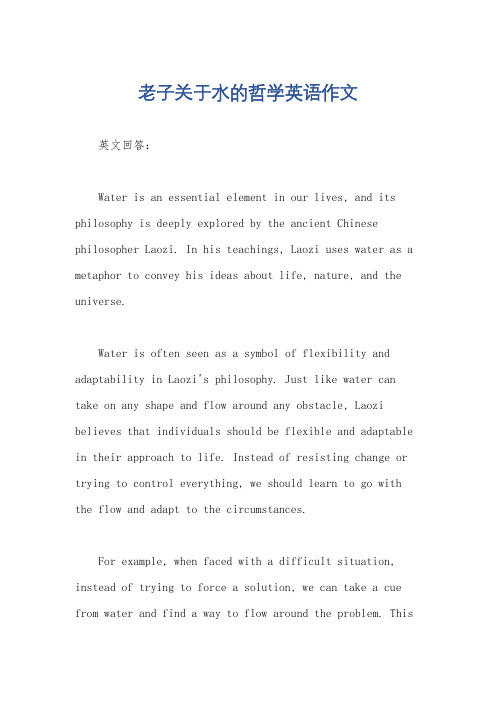
老子关于水的哲学英语作文英文回答:Water is an essential element in our lives, and its philosophy is deeply explored by the ancient Chinese philosopher Laozi. In his teachings, Laozi uses water as a metaphor to convey his ideas about life, nature, and the universe.Water is often seen as a symbol of flexibility and adaptability in Laozi's philosophy. Just like water can take on any shape and flow around any obstacle, Laozi believes that individuals should be flexible and adaptable in their approach to life. Instead of resisting change or trying to control everything, we should learn to go with the flow and adapt to the circumstances.For example, when faced with a difficult situation, instead of trying to force a solution, we can take a cue from water and find a way to flow around the problem. Thiscan help us avoid unnecessary stress and frustration, and ultimately lead to a more harmonious and balanced life.In addition, water is also a symbol of purity and clarity in Laozi's philosophy. Just as water is clear and transparent, Laozi encourages individuals to cultivate a sense of inner clarity and purity. By letting go of negative emotions and thoughts, we can achieve a sense of peace and tranquility that allows us to see things more clearly and make better decisions.In conclusion, Laozi's philosophy on water teaches us valuable lessons about flexibility, adaptability, purity, and clarity. By embodying these qualities in our own lives, we can navigate the ups and downs with grace and wisdom.中文回答:水是我们生活中不可或缺的元素,古代中国哲学家老子深入探讨了水的哲学。
介绍鱼的象征英语作文

介绍鱼的象征英语作文The Symbolism of Fish.Throughout history and across cultures, the fish has held a rich and diverse array of symbolic meanings. Fromits representation in ancient art and mythology to its role in modern culture and religion, the fish has served as a powerful symbol, often conveying deep spiritual andcultural values.In ancient times, the fish was often associated with fertility, abundance, and prosperity. This association can be traced back to the fish's natural reproductive cycle, which involves laying eggs in large numbers. The abundance of fish in the sea was also a testament to their fertility and prosperity, making them a symbol of plenty and wealth. In some cultures, the fish was even believed to have the power to transform and regenerate, further emphasizing its association with fertility and new beginnings.In mythology, the fish often appears as a creature with 神奇的能力. For instance, in Greek mythology, the fish was associated with Poseidon, the god of the sea, who rode a chariot pulled by sea horses and had the ability to transform into a fish to escape danger. In Norse mythology, the fish played a prominent role in the creation story, where it was said to have swum through the primordial waters and given birth to the first beings of the universe. These mythological representations further emphasize the fish's association with fertility, transformation, and the primal forces of creation.In Christianity, the fish has come to symbolize Jesus Christ and his ministry. This association can be traced back to the ancient Greek word "ichthys," which stands for "Jesus Christ, Son of God, Savior." The word "ichthys" can be arranged to form a monogram in Greek, resembling a fish, and was often used as a secret symbol by early Christians to identify themselves and their faith. The fish also appears in Christian iconography, often depicted swimming upstream against the current, symbolizing Jesus's struggle against sin and Satan and his ultimate victory throughresurrection and ascension.In addition to its religious significance, the fish has also been a popular symbol in art and culture throughout the ages. From ancient pottery and frescos to modern popart and tattoos, the fish has been a recurring motif in visual arts. Its unique shape and graceful lines make it an appealing subject for artists, while its rich symbolic meanings allow it to convey a wide range of emotional and spiritual messages.In modern times, the fish has also come to symbolize peace, harmony, and unity. This association can be seen in the practice of fishing, which often requires patience, stillness, and a connection with nature. By fishing, people can find a sense of tranquility and connection with the natural world, while also appreciating the bounty of the sea. The fish has also become a popular symbol in environmental conservation movements, representing the need to protect and preserve our marine ecosystems for future generations.In conclusion, the fish has held a diverse array of symbolic meanings throughout history and across cultures. From its association with fertility, abundance, and prosperity in ancient times to its role as a symbol of Jesus Christ and his ministry in Christianity, the fish has served as a powerful symbol in human culture and religion. Its unique shape and graceful lines have made it a popular subject for artists, while its rich symbolic meanings have allowed it to convey a wide range of emotional andspiritual messages. In modern times, the fish has come to symbolize peace, harmony, and unity, further emphasizingits role as a bridge between human beings and the natural world.。
认识鱼作文英语翻译带翻译

在这篇文章中,我们将深入探讨鱼类的迷人世界,探索它们的生物学、栖息地、对生态系统的重要性以及人类与鱼类之间的关系。
了解鱼类的生物学:
鱼类属于脊索动物门,其特征包括流线型的身体、鳍和用于呼吸的鳃。
它们以各种形状和大小出现,从微小的矮深海鲈鱼到巨大的鲸鲨。
鱼类展示了适应其环境的惊人多样性,比如石鱼的伪装能力或灯笼鱼的生物发光能力。
鱼类的栖息地:
鱼类栖息在各种水域中,包括淡水湖泊和河流、盐水海洋和半咸淡水的河口。
每种栖息地都对鱼类的生存提出了独特的挑战和机遇。
例如,像鲑鱼这样的淡水鱼要穿越湍急的河流到达产卵地,而像潜水鳗鲡这样的深海鱼已经适应了海洋深处的极端压力和黑暗。
对生态系统的重要性:
鱼类在水生生态系统中发挥着至关重要的作用,既是捕食者又是被捕食者。
它们帮助调节其他生物的种群,控制藻类的生长,并维持食物网的平衡。
此外,鱼类通过排泄和分解过程有助于营养循环。
对于许多沿海社区来说,鱼类也是重要的食物和收入来源。
人类与鱼类的互动:。
得莫利活鱼英语介绍
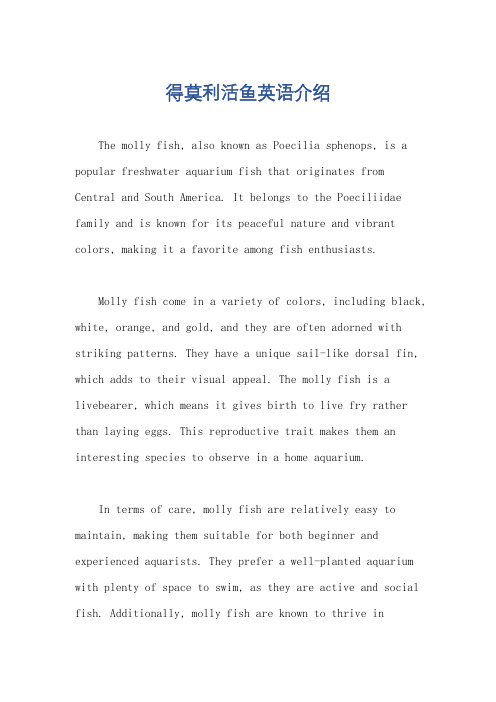
得莫利活鱼英语介绍The molly fish, also known as Poecilia sphenops, is a popular freshwater aquarium fish that originates from Central and South America. It belongs to the Poeciliidae family and is known for its peaceful nature and vibrant colors, making it a favorite among fish enthusiasts.Molly fish come in a variety of colors, including black, white, orange, and gold, and they are often adorned with striking patterns. They have a unique sail-like dorsal fin, which adds to their visual appeal. The molly fish is a livebearer, which means it gives birth to live fry rather than laying eggs. This reproductive trait makes them an interesting species to observe in a home aquarium.In terms of care, molly fish are relatively easy to maintain, making them suitable for both beginner and experienced aquarists. They prefer a well-planted aquarium with plenty of space to swim, as they are active and social fish. Additionally, molly fish are known to thrive inslightly brackish water conditions, although they can also adapt to full freshwater setups.When it comes to diet, molly fish are omnivorous and will eat a variety of foods, including high-quality flake or pellet food, as well as live or frozen options such as bloodworms and brine shrimp. It's important to provide a balanced diet to ensure their overall health and vibrant coloration.In terms of behavior, molly fish are generally peaceful and can be kept with other peaceful fish species of similar size. However, it's important to avoid keeping them withfin-nipping or aggressive tank mates. They are known to be active swimmers and can often be seen exploring the aquarium and interacting with their environment.In conclusion, the molly fish is a popular and attractive freshwater aquarium fish known for its peaceful nature, vibrant colors, and livebearing reproductive behavior. With proper care and a suitable environment,molly fish can thrive and bring enjoyment to aquarists of all levels of experience.。
英语作文鱼和鱼竿
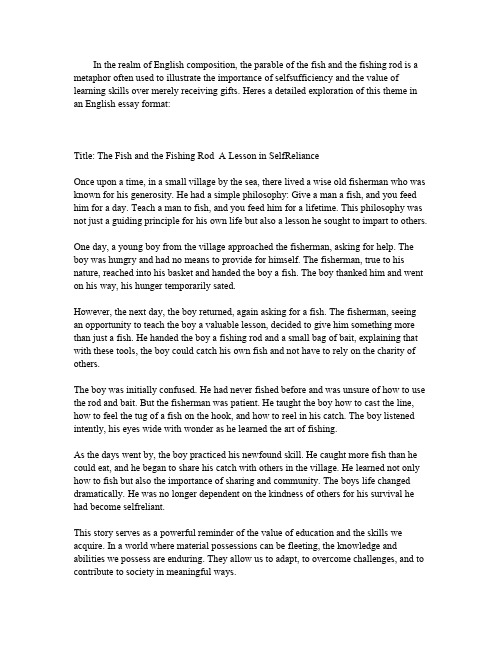
In the realm of English composition,the parable of the fish and the fishing rod is a metaphor often used to illustrate the importance of selfsufficiency and the value of learning skills over merely receiving gifts.Heres a detailed exploration of this theme in an English essay format:Title:The Fish and the Fishing Rod A Lesson in SelfRelianceOnce upon a time,in a small village by the sea,there lived a wise old fisherman who was known for his generosity.He had a simple philosophy:Give a man a fish,and you feed him for a day.Teach a man to fish,and you feed him for a lifetime.This philosophy was not just a guiding principle for his own life but also a lesson he sought to impart to others. One day,a young boy from the village approached the fisherman,asking for help.The boy was hungry and had no means to provide for himself.The fisherman,true to his nature,reached into his basket and handed the boy a fish.The boy thanked him and went on his way,his hunger temporarily sated.However,the next day,the boy returned,again asking for a fish.The fisherman,seeing an opportunity to teach the boy a valuable lesson,decided to give him something more than just a fish.He handed the boy a fishing rod and a small bag of bait,explaining that with these tools,the boy could catch his own fish and not have to rely on the charity of others.The boy was initially confused.He had never fished before and was unsure of how to use the rod and bait.But the fisherman was patient.He taught the boy how to cast the line, how to feel the tug of a fish on the hook,and how to reel in his catch.The boy listened intently,his eyes wide with wonder as he learned the art of fishing.As the days went by,the boy practiced his newfound skill.He caught more fish than he could eat,and he began to share his catch with others in the village.He learned not only how to fish but also the importance of sharing and community.The boys life changed dramatically.He was no longer dependent on the kindness of others for his survival he had become selfreliant.This story serves as a powerful reminder of the value of education and the skills we acquire.In a world where material possessions can be fleeting,the knowledge and abilities we possess are enduring.They allow us to adapt,to overcome challenges,and to contribute to society in meaningful ways.The fish represents immediate relief,a temporary solution to a problem.It is a gift that, while appreciated,does not lead to longterm change.The fishing rod,on the other hand, symbolizes the tools and knowledge necessary for selfsufficiency.It is the means by which one can achieve independence and personal growth.In our modern society,the lesson of the fish and the fishing rod is still relevant.Whether its learning a new language,acquiring technical skills,or developing the ability to think critically,the pursuit of knowledge is a lifelong journey.It empowers individuals to navigate the complexities of life and to contribute positively to the world around them. In conclusion,the parable of the fish and the fishing rod is a timeless tale that speaks to the heart of human potential.It encourages us to look beyond immediate gratification and to invest in the skills and knowledge that will serve us well throughout our lives.It is a call to action,urging us to become active learners and to embrace the opportunities for growth that are always within our reach.This essay explores the metaphor in a narrative style,drawing out the moral of the story and its relevance to personal development and societal contribution.It emphasizes the importance of learning and selfreliance over mere dependence on the generosity of others.。
四年级英语哲学思想单选题30题
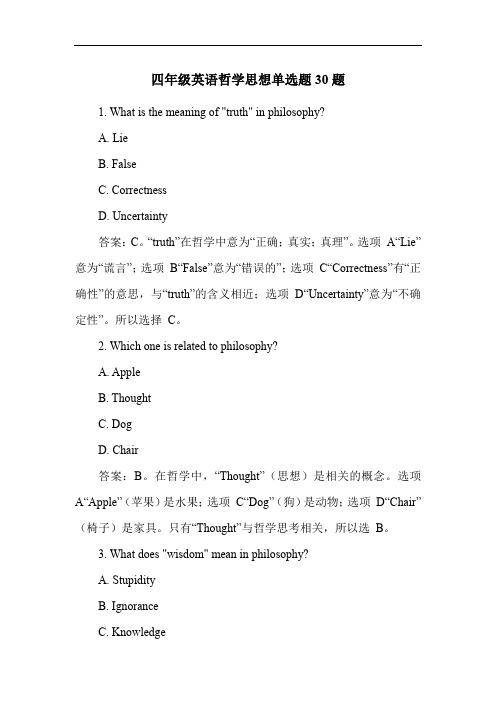
四年级英语哲学思想单选题30题1. What is the meaning of "truth" in philosophy?A. LieB. FalseC. CorrectnessD. Uncertainty答案:C。
“truth”在哲学中意为“正确;真实;真理”。
选项A“Lie”意为“谎言”;选项B“False”意为“错误的”;选项C“Correctness”有“正确性”的意思,与“truth”的含义相近;选项D“Uncertainty”意为“不确定性”。
所以选择C。
2. Which one is related to philosophy?A. AppleB. ThoughtC. DogD. Chair答案:B。
在哲学中,“Thought”(思想)是相关的概念。
选项A“Apple”((苹果)是水果;选项C“Dog”((狗)是动物;选项D“Chair”(椅子)是家具。
只有“Thought”与哲学思考相关,所以选B。
3. What does "wisdom" mean in philosophy?A. StupidityB. IgnoranceC. KnowledgeD. Confusion答案:C。
“wisdom”在哲学中表示“智慧”。
选项A“Stupidity”意为“愚蠢”;选项B“Ignorance”意为“无知”;选项C“Knowledge”有“知识;学问”的意思,与“wisdom”有一定关联;选项D“Confusion”意为“困惑”。
因此选择C。
4. In philosophy, "goodness" is opposite toA. EvilB. BeautyC. KindnessD. Happiness答案:A。
在哲学中,“goodness”((善)的对立面是“Evil”((恶)。
选项B“Beauty”意为“美”;选项C“Kindness”意为“仁慈;善良”;选项D“Happiness”意为“幸福”。
鱼的ppt课件英语

02
Easy vocabulary
The language used in simple English stories of fish is usually
easy to understand, with simple words and presence structures
03
Educational value
Scales
"Smooth
scales",
"Rough scales", "Adult
scales"
The English expression describing the behavioral
habits of fish
Swing pattern
"Learning", "Solitary", "Aggregative"
Feeding behavior
"Carnivorous", "Herbavorous", "Omnivorous"
Introduction
"Spawning", "Oviparous", "Viviparous"
The English expression for describing the living environment of fish
Literary value
These stories are often considered classes of children's literature and can introduce young readers to the beauty and depth of the English language
Fish is Fish建构主义
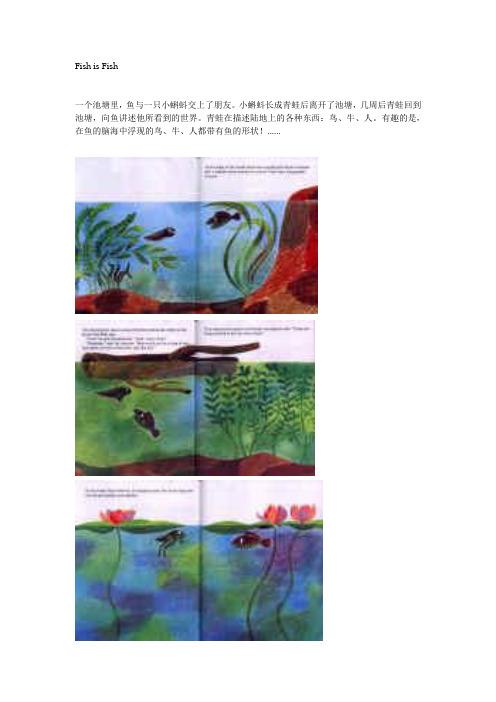
Fish is Fish一个池塘里,鱼与一只小蝌蚪交上了朋友。
小蝌蚪长成青蛙后离开了池塘,几周后青蛙回到池塘,向鱼讲述他所看到的世界。
青蛙在描述陆地上的各种东西:鸟、牛、人。
有趣的是,在鱼的脑海中浮现的鸟、牛、人都带有鱼的形状!......At the edge of the woods there was a pond, and there a minnow and a tadpole swam among the weeds. They were inseparable friends.One morning the tadpole discovered that during the night he had grown two little legs. “Look” he said triumphantly. “Look, I am a frog!”“Nonsense,”said the minnow. “How could you be a frog if only last night you were a little fish, just like m e!”They argued and argued until finally the tadpole said,“Frogs are frogs and fish is fish and that's that!”In the weeks that followed, the tadpole grew tiny front legs and his tail got smaller and smaller.And then one fine day, a real frog now, he climbed out of the water and onto the grassy bank.The minnow too had grown and had become a full-fledged fish. He often wondered where his four-footed friend had gone. But days and weeks went by and the frog did not return.Then one day, with a happy splash that shook the weeds, the frog jumped into the pond. “Where have you been?”asked the fish excitedly.“I have been about the world----hopping here and there,”said the frog,“and I have seen extraordinary things.”“Like what?”asked the fish.“Birds,”said the frog mysteriously. “Birds!” And he told the fish about the birds, who had wings, and two legs, and many, many colors.As the frog talked, his friend saw the birds fly through his mind like large feathered fish. “What else?”asked the fish impatiently.“Cows,”said the frog.“Cows! They have four legs, horns, eat grass, and carry pink bags of milk.”“And people!”said the frog.“Men, women, children!” And he talked and talked until it was dark in the pond.But the picture in the fish's mind was full of lights and colors and marvelous things and he couldn't sleep. Ah, if he could only jump about like his friend and see that wonderful world.And so the days went by. The frog had gone and the fish just lay there dreaming about birds in flight, grazing cows, and those strange animals, all dressed up, that his friend called people.One day he finally decided that come what may, he too must see them. And so with a mighty whack of the tail he jumped clear out of the water onto the bank.He landed in the dry, warm grass and there he lay gasping for air, unable to breathe or to move.“Help,”he groaned feebly.Luckily the frog, who had been hunting butterflies nearby, saw him and with all his strength pushed him back into the pond.Still stunned, the fish floated about for an instant. Then he breathed deeply, letting the clean cool water run through his gills. Now he felt weightless again and with an ever-so-slight motion of the tail he could move to and fro, up and down, as before.The sunrays reached down within the weeds and gently shifted patches of luminous color. This world was surely the most beautiful of all worlds. He smiled at his friend the frog, who sat watching him from a lily leaf. “You were right,” he said. “Fish is fish.”原文标题:Fish is Fish ——建构主义学习理论图解案例- 教育档客原文网址:/article/585366.html。
